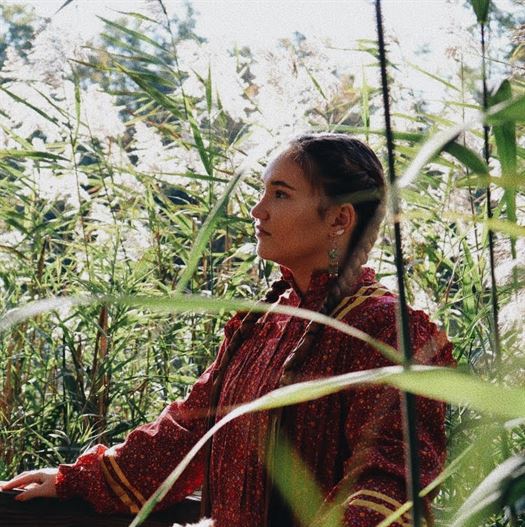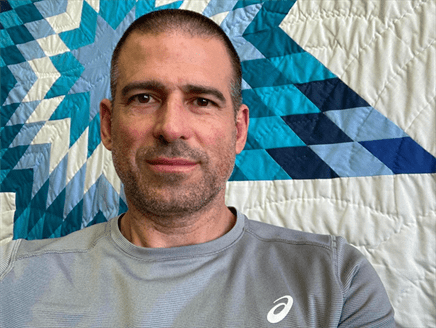A Lenni-Lenape student is teaming up with Montclair State University professors to create an indigenous studies minor.
Brianna Dagostino is a senior history major and Nanticoke Lenni-Lenape tribal member, one of New Jersey’s three state-recognized tribes. When she was in high school, a girl messaged her on Instagram about the word “Lenape” in her bio and asked if she went to Lenape High School.
“That was kind of a wow moment for me,” Dagostino said. “I was like… ‘these people, when they hear the word Lenape, they think of a high school and not a Native American tribe, even though this high school was named after us.’ That was the first time where I was like, ‘oh, like people really don’t know about us, you know about Native Americans.’”

Brianna Dagostino is looking to start an indigenous studies minor at Montclair State.
Photo courtesy of Brianna Dagostino
Now at Montclair State, Dagostino has taken courses with professors Christopher Matthews and Elsbeth Martini, who are in the process of developing an indigenous studies minor for the university. She hopes to broaden people’s understanding of her culture and people.
“I think it is very important for Native American history to be taught solely by itself, not with, you know, American history,” Dagostino said.
Dagostino has been involved in the process since the minor’s inception and is one of the students accredited for its inspiration, also writing a letter of support to the school board for moving words into action.
“Because I was like, after that situation, I want people to know who we are,” Dagostino said.
This was not the only occurrence where Dagostino encountered ignorance about her heritage, having been educating her classmates about her tribe since childhood.
“I always tell everyone, like especially in grammar school and high school, like the educational books — they’re written for Caucasians,” Dagostino said. “When we get older, it’s our job to educate ourselves on the truth.”
Mark Clatterbuck, associate professor of religious studies and acting chairperson, is also on the team of professors creating an indigenous studies minor.
“There are not a lot of schools that offer a Native American studies or indigenous studies program here in the East,” Clatterbuck said. “[They] tend to be in parts of the country where there are large indigenous populations with land bases or have very close ties to that community.”
Clatterbuck, along with professors Christopher Matthews and Elspeth Martini, have been organizing events for Native American Heritage month together since 2015.
They began brainstorming about the program after recognizing students who shared their classes, like Dagostino, also influenced by their specialties in indigenous history, religion and culture. More have recently joined the team.
Matthews, an anthropology professor, says New Jersey schools do not focus on indigenous education.
“We’ve discovered in meeting with members of the tribes in the state [that] they universally agree that New Jersey does not seem to put much effort into educating public school students about the history of New Jersey tribes or especially their continuing presence in the state,” Matthews said. “Native American history ends after the first day of social studies class. There were Indian people here. Now they’re not here. And that’s obviously inaccurate and racist and you know, troubling.”
The minor will be 18 credits in total, focusing on global indigenous studies in addition to the U.S., with a dedicated focus on New Jersey’s indigenous communities.
Though the minor has not yet been finalized, it consists of a new introductory course on indigenous studies, four existing courses drawing from the fields of religion, anthropology, history and a capstone course.
The capstone course will most likely function as a field-based research project or community engagement, creating opportunities for students to integrate what they are learning and their passions with real-world experiences that benefit local native communities.
“We just want to be sure that the program doesn’t become a burden to them,” Clatterbuck said. “But it’s actually life-giving in both directions.”
Clatterbuck, whose primary research focuses on Native North American encounters with Christianity, says he wrestles with this dilemma of taking from native communities without giving back all of the time. He notes the history of nonnative scholars using indigenous knowledge for publishing articles and inner circle conversations, nothing more.
“It never benefited the communities themselves. It only extracted,” Clatterbuck said. “And that’s why we’re working so closely with tribal leaders right now in shaping the program, that doesn’t just feel like it somehow benefits the university or benefits the students, without also really, genuinely benefiting the tribal communities in concrete ways.”
The indigenous studies minor will most likely be available to students in the fall of 2022. Until then, Montclair State offers courses on indigenous history, religion, culture, anthropology and archeology field work dedicated to both historically Black and native communities.
Dagostino says she is proud of the university for getting the ball rolling and taking the time to teach students about her history, noting that it is the first of its kind in New Jersey.





